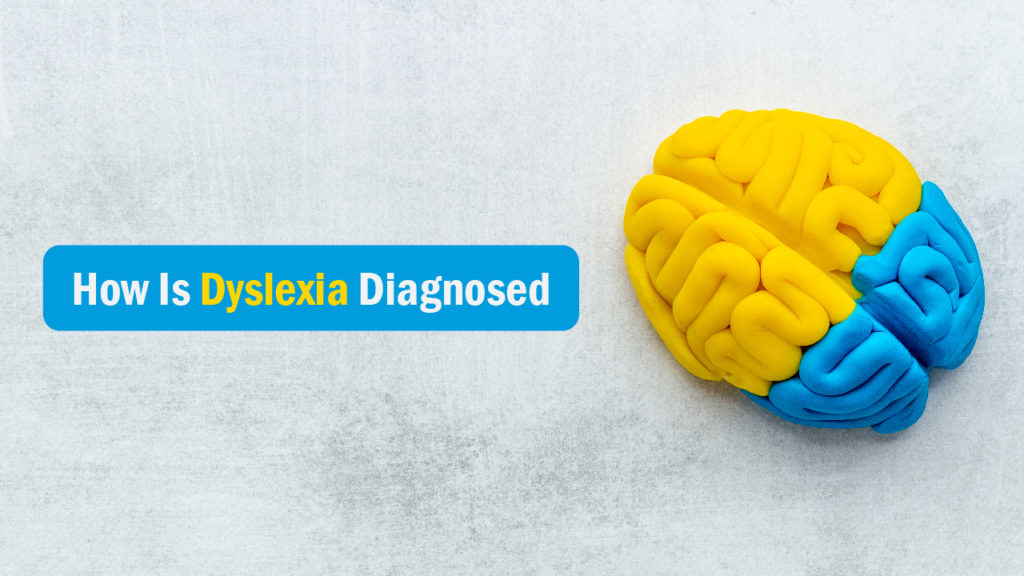The Diagnostic and Statistical Manual, Fifth Edition states that dyslexia is a specific learning disability that is not brought on by any severe sensory, neurological, or intellectual abnormalities, or by sociocultural factors.
The capacity of kids to listen, think, talk, write, spell, or perform mathematical calculations is interfered with by specific learning difficulties. It’s not always easy to tell if a learner has a learning disability because it’s a complex issue. In this regard, dyslexia differs significantly from a disease or other medical condition.

How A Dyslexia Diagnosis is Made
Only after a thorough evaluation, which typically includes an IQ test like the Wechsler Intelligence Scale for Children, can a dyslexia diagnosis be made. This assessment also takes into account a child’s reading proficiency as well as other elements including general academic prowess and family history.
A lot of information is typically needed, and the child will be put through a number of tests by the individual doing the evaluation. Because it’s crucial to rule out alternate scenarios like intellectual disability and visual issues, thoroughness is required. These two conditions are not the same as dyslexia.
Among the elements of a thorough educational evaluation are the following:
Tests of Hearing and Vision
These exams can rule out the possibility that a youngster has physical problems. Consequently, issues with vision or hearing will have a significant negative impact on learning.
Developmental Histories, Sociological and Emotional Background
Whatever the nature of the developmental concerns, an assessor will be interested in them. Even physical achievements like crawling may be significant in this case. The child’s home and school environment as well as their capacity for emotion regulation are additional crucial variables.
Tests of Specific Skills
The child will take a number of tests throughout the assessment. The exams measure abilities such as:
- Phonological processing, including phonemic and phonological awareness. Phonemic awareness is a subset of phonological awareness that focuses on identifying and manipulating phonemes, the smallest sound units. Phonological awareness refers to a person’s understanding of the sound structure of language.
- Decoding is the skill of using your understanding of letter-sound correspondences, especially letter patterns, to accurately pronounce written words.
- Effective word recognition abilities are necessary for reading fluently. Word recognition is the skill of being able to instantaneously recognize full words by sight without having to sound them out.
- A reader’s capacity to effectively interpret a text and relate its concepts to their prior knowledge is referred to as reading comprehension. Students with dyslexia often perform poorly on reading comprehension exams because they struggle with decoding and fluency.
- Vocabulary knowledge is one of the most crucial elements in reading comprehension. According to research, vocabulary proficiency accounts for between 50 and 60 percent of the variation in reading comprehension results.
- Speaking and listening are two aspects of oral language skills. According to research, spoken language skills are not only crucial for learning to read, but they also have a reciprocal link with reading skills.
- Quick naming calls for the youngster to swiftly name recognizable objects, letters, or numbers.
- The capacity for short-term information storage and manipulation is known as working memory.
To ascertain whether learning problems exist, the physician compiles and analyzes all of this data. The results of the assessment will also be utilized to make suggestions for the type and scope of educational interventions that the kid will require to successfully navigate difficult situations.
Difference Between Dyslexia Screening and Dyslexia Testing
If you are thinking about having your child assessed, you’ve probably seen indications of a reading issue, difficulty learning, or subpar academic achievement. It’s a good idea to look into these indicators as soon as a parent, other family members, or the child’s teachers observe them.
Screening and assessment are the two techniques for figuring out the type and severity of a learning challenge.
A technique for locating children who are at risk is screening. Typically, this takes the shape of a quick test. The findings are helpful but not definitive. By their very nature, these tests are insufficient to support a diagnosis.
A formal dyslexia evaluation, on the other hand, is a customized, in-depth procedure that tries to depict the strengths and weaknesses of a specific child.
What Happens After A Dyslexia Test?
You could feel relieved if your child is identified as having dyslexia after receiving a thorough evaluation. Your search for an explanation for why your child is struggling in school is now over. But anxiety and panic might also be induced by the news. Understandably, you might be concerned that dyslexia will be a constant challenge. It’s comforting to know that this is not always the case. If you find yourself in this scenario, you can take the following actions:
Get an Individualized Education Plan (IEP) in Place
A specific type of learning difficulty is dyslexia. A dyslexic youngster is therefore entitled to additional support as needed. This is referred to as an Individualized Education Plan(IEP) in the United States.
You may be able to use Section 504 of the Rehabilitation Act of 1973 if your child has been professionally diagnosed with dyslexia but does not meet the criteria for special accommodations at school. It is a different way to get your kid extra services like extra time for testing or help in the classroom with their academics.
Identify and Nurture Your Child’s Strengths
A youngster with dyslexia could feel emotionally distressed as a result of learning about the diagnosis or realizing their educational limits. Focusing on your child’s abilities, whatever they may be, is a terrific approach to counteract this and help your child regain confidence and self-esteem.
Consider Online Tutoring for Dyslexia
For students with dyslexia, dyscalculia, dysgraphia, and other learning disabilities, I Empower, LLC offers dyslexia training online.I Empower, LLC also offers dyslexia training for teachers and parents.
Helping Your Child Overcome Dyslexia
Even if your child’s reading difficulties have a genetic basis, this does not mean that they are untreatable or that they will always struggle to learn.
The function of neuroplasticity is a consideration. The brain develops new neural networks as a result of training and education throughout life. This is what occurs to a child’s brain when they receive reading interventions to help them become better readers.
A great deal of evidence suggests that the outlook for a child with dyslexia can apparently be greatly improved, especially if problems are identified and addressed at an early age.
The vision of I Empower, LLC is that every parent, teacher, and student is aware of the lookouts for dyslexia as well as the appropriate interventions and accommodations that must be made in order to help those who are affected lead lives in which they feel confident and empowered.
Students, teachers, and parents can sign up for the dyslexia training program offered by I Empower, LLC.
